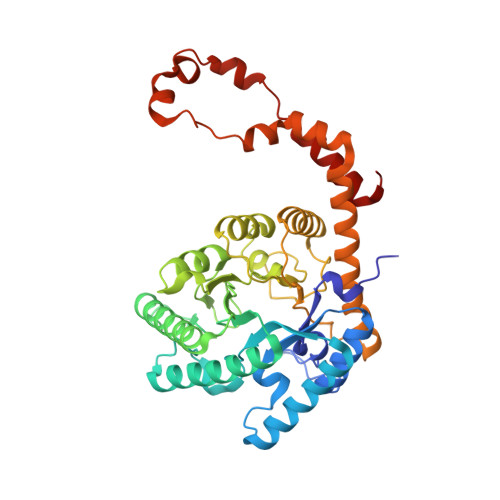Crystal structure of the metal-free state of glucose isomerase reveals its minimal open configuration for metal binding.
Nam, K.H.(2021) Biochem Biophys Res Commun 547: 69-74
- PubMed: 33610042
- DOI: https://doi.org/10.1016/j.bbrc.2021.02.026
- Primary Citation of Related Structures:
7CJO, 7CJP - PubMed Abstract:
Glucose/xylose isomerase catalyzes the reversible isomerization of d-glucose and d-xylose to d-fructose and d-xylulose, respectively. This enzyme is not only involved in sugar metabolism but also has industrial applications, such as in the production of high fructose corn syrup and bioethanol. Various crystal structures of glucose isomerase have shown the binding configuration of the substrate and its molecular mechanism; however, the metal binding mechanism required for the isomerization reaction has not been fully elucidated. To better understand the functional metal binding, the crystal structures of the metal-bound and metal-free states of Streptomyces rubiginosus glucose isomerase (SruGI) were determined at 1.4 Å and 1.5 Å resolution, respectively. In the meal-bound state of SruGI, Mg 2+ is bound at the M1 and M2 sites, while in the metal-free state, these sites are occupied by water molecules. Structural comparison between the metal binding sites of the metal-bound and metal-free states of SruGI revealed that residues Glu217 and Asp257 exhibit a rigid configuration at the bottom of the metal binding site, suggesting that they serve as a metal-binding platform that defined the location of the metal. In contrast, the side chains of Glu218, His220, Asp255, Asp257, and Asp287 showed configuration changes such as shifts and rotations. Notably, in the metal-free state, the side chains of these amino acids are shifted away from the metal binding site, indicating that the metal-binding residues exhibit a minimal open configuration, which allows metal binding without large conformational changes.
- Department of Life Science, Pohang University of Science and Technology, Pohang, 37673, Republic of Korea. Electronic address: structures@postech.ac.kr.
Organizational Affiliation:

















